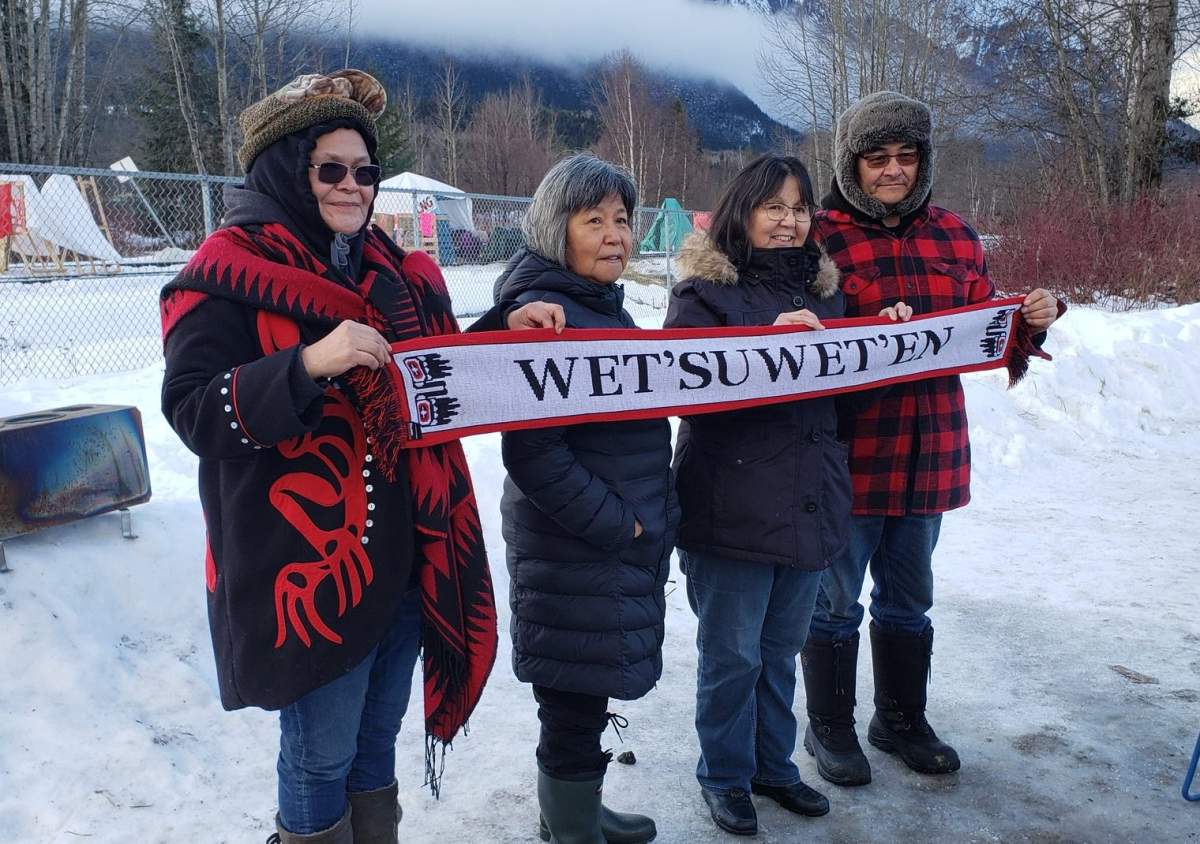A rail blockade of the main CN Rail line in northern B.C. has been taken down after the provincial and federal governments agreed to meet with the Gitxsan and Wet’suwet’en hereditary chiefs.

One of those chiefs, Chief Spookwx, told Global News Thursday afternoon that he was helping to take down the blockade on the tracks near New Hazelton, which had been in place since Saturday afternoon.
The blockade is one of several that have been set up on rail lines across the country in solidarity with the Wet’suwet’en hereditary chiefs and their supporters, who are opposing construction of the Coastal GasLink pipeline on their ancestral lands near Houston, B.C.
Chief Spookwx said he has received letters from both Premier John Horgan and Prime Minister Justin Trudeau that were sent to the hereditary chiefs of both clans, and has agreed to take down the blockade until the meeting takes place.
“It all depends on them.”

Get breaking National news
The province has agreed to send Indigenous Relations Minister Scott Fraser to the meeting.
The Prime Minister’s Office has agreed to send federal Minister of Crown–Indigenous Relations Carolyn Bennett to the meeting. The details are still being worked out on when the meeting will take place.

Spookwx could not say when the meeting will happen, only that he is working to set it up “as quickly as possible.”
“There’s an urgency to it,” he said. “They’ve agreed to come and meet, so now we have an opportunity to try and correct their mistake with the Wet’suwet’en.”
The blockade was set up on traditional Gitxsan lands that Spookwx oversees. The chief could not guarantee that other blockades won’t be set up on other parts of the rail line in northern B.C.
“I can’t speak for the other chiefs,” he said. “The only spot that I control is right here.
- B.C. school shooting victim will always be remembered, soccer coach says
- B.C. shooting raises school safety issue — should students ‘run, hide and fight’?
- B.C. to hold day of mourning Thursday following Tumbler Ridge tragedy
- Tumbler Ridge shooting: 5 students, teacher dead as BC RCMP identifies shooter
“It’s on Spookwx territory. I’m Chief Spookwx . This is the territory I control.”
The blockade effectively shut down all activity at the Port of Prince Rupert, with hundreds of trains unable to move in or out of the busy northern port.
Trudeau confirmed he has spoken with Horgan about the protests disrupting rail service in B.C. and across Canada, which has created economic pressure along with similar blockades at ports on the western and eastern coasts.
While the blockade in the north is coming down, a new group of protesters have shut down CP rail activity in Metro Vancouver, along with the West Coast Express commuter train to the Fraser Valley.
Protesters and the hereditary chiefs themselves say they will continue to shut down economic activity in Canada until the government revokes the permits for the Coastal GasLink pipeline.
“As soon as the Wet’suwet’en said no, the province started looking around for other people who would say yes to Coastal GasLink,” Spookwx said. “That’s how they ended up with the elected band council.
“But they have absolutely no say. The hereditary chiefs are the only ones that have a say on the territory of the Wet’suwet’en.”
The $6.6-billion project is meant to carry natural gas from northeastern B.C. to Kitimat.
The company has signed benefits agreements with all 20 elected Indigenous councils along the route.
But hereditary chiefs who oppose the project say elected councils only have jurisdiction over First Nations reserves. The hereditary chiefs claim authority over rights and title to land that was never covered by treaty.
— With files from Richard Zussman








Comments
Want to discuss? Please read our Commenting Policy first.